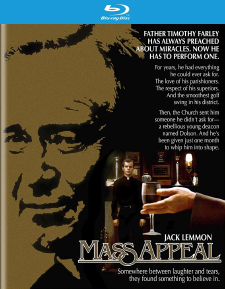Mass Appeal (Blu-ray Review)

Director
Glenn JordanRelease Date(s)
1984 (December 14, 2021)Studio(s)
Universal Pictures (Code Red)- Film/Program Grade: A-
- Video Grade: C+
- Audio Grade: B-
- Extras Grade: D-
Review
Mass Appeal is a sadly neglected 1984 film that examines the relationship between an older priest and the idealistic young deacon who has been assigned to him. Father Farley (Jack Lemmon) is a popular priest in a large parish who has grown complacent and unwilling to do or say anything that could put his popularity at risk—he’s content to tell people what they want to hear, rather than what they need to hear. Mark Dolson (Zeljko Ivanek) is an impassioned seminary student who’s been assigned to Father Farley to stay out of trouble, but Dolson simply won’t accept the kind of compromises that Farley has been making. Farley does his best to try and impart his own blandly safe style to Dolson, but when Dolson’s past becomes an issue for the seminary leadership, Farley is forced to confront that leadership, as well as what he’s allowed himself to become.
Television veteran Glenn Jordan directed the film from a screenplay by Bill C. Davis, who adapted his own play. Originally a two-character drama, Davis opened it up for the film by adding some peripheral characters as well as two key ones: Monsignor Burke (Charles Durning) as the antagonistic head of the seminary, and Margaret (Louise Latham) as Farley’s supportive but frustrated housekeeper. Opening up a play can sometimes be detrimental to its effectiveness; but in this case, the addition of those two characters is a clear improvement. All of the actors are superb, but it’s really difficult to imagine the film without Latham’s scene-stealing performance as the only person at the parish who understands that Farley needs Dolson to shake him out of his complacency.
On a superficial level, Mass Appeal appears to be about social issues with which the Catholic Church has long struggled, but it’s really about speaking truth to power, and standing up for what is morally right regardless of the consequences. Dolson correctly accuses Farley of engaging in performative “song and dance theology”—avoiding the truth in order to keep his parishioners entertained, rather than challenged. That’s confirmed when one of them complains to Farley about Dolson’s fiery first sermon, telling Farley that “I come to mass because of you. I do not come to be preached to!” Farley needs to learn the hard lessons that there can be no true love without honesty, and that being honest often comes at great personal risk. Only at the end does he admit that fact to his flock:
“I have baptized you, I’ve counseled you, I’ve married you, and I’ve buried you. But I never really—cared enough, to run the risk of losing you. That’s my sin of omission… Up ‘til now, my need for your love has kept me silent. Inactive. This is the first time I’ve ever said what I wanted to you. Only now, is love possible.”
Cinematographer Don Peterman shot Mass Appeal on 35 mm film using Panavision Panaflex cameras with spherical lenses, framed at the 1.85:1 aspect ratio for its theatrical release. There's no information available about the master that Universal provided for Code Red’s Blu-ray, but it appears to be from the DVD era. It looks fine on a small screen, but when viewed on a larger one, the defects become clearer. The optically printed opening titles are soft with reduced contrast, and while that does improve once they’re finished, there’s still a lack of fine detail, with smeared textures. It isn’t completely smooth, but there’s definitely been noise reduction applied, and sharpening as well—there’s occasional light ringing along the edges of objects. The entire image is swarming with noise that may appear like grain from a distance, but it looks artificial and processed from up close. There are also a few faint scratches that haven’t been fully erased by the noise reduction. Contrast and colors are adequate, though there’s a bit of crush to the blacks in some shots. Taken as a whole, this Blu-ray is an upgrade over the DVD despite all of the flaws, but be aware that the larger your screen, the more noticeable that they are.
Audio is limited to English 2.0 mono DTS-HD Master Audio, with optional English SDH subtitles. It’s an unremarkable track with a bit of excessive sibilance, but the dialogue is otherwise clear, and the lively score by Bill Conti sounds solid.
The sole extra is a collection of trailers:
- Theatrical Trailer (HD – 1:36)
- Story of a Woman Trailer (HD – 2:23)
- One More Train to Rob Trailer (SD – 2:35)
- Pufnstuf Trailer (SD – 2:49)
- Checkered Flag or Crash Trailer (SD – 2:34)
Oddly enough, the trailers aren’t listed individually, but can only be played as a group (though they are encoded as individual chapters). It's an... interesting selection to include with a film like this.
Mass Appeal was a sleeper during its theatrical release, and it isn’t very well-remembered today, so it’s not surprising that it hasn’t been given a fresh scan or any extras for its Blu-ray release. Yet the fact that it’s on Blu-ray at all is still a cause for celebration, as it’s an underrated film that deserves a wider audience. The universal nature of its truths are as relevant as ever today.
- Stephen Bjork
(You can follow Stephen on Facebook at this link)

